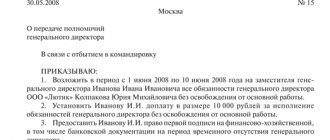Temporary performance of duties: legal basis
To fulfill the duties of a temporarily absent employee, another employee of the organization may be entrusted with additional work without exemption from his main work, defined by the employment contract (Article 60.2 of the Labor Code of the Russian Federation).
As you can see, this norm does not disclose the concepts of “acting duties” and “temporarily performing duties,” but establishes the order in which additional official duties can be assigned to an employee without changing his position. Namely:
- The timing, volume and content of additional work assigned to an employee in connection with the temporary absence of another employee are determined by the employer with the written consent of the employee on whom such obligations are supposed to be assigned.
- The employee has the right at any time to refuse to fulfill the additional obligations assigned to him, just as the employer can cancel this order. In this case, the party that made the corresponding decision must notify the other party to the employment contract in writing about this at least 3 days in advance.
If the parties to the employment contract have reached an agreement on this issue, the employer issues a corresponding order to assign responsibilities (or temporarily assign responsibilities) to a specific employee. Typically, such an order also indicates the deadline for the employee to perform additional work. For example: “for the period of absence of the main employee”, “for the period of the main employee’s stay on a business trip”, “for the period of the main employee’s stay on sick leave”, etc.
We discussed the subtleties of preparing the necessary documentation in another article - “Drawing up an order to combine positions - sample”, we recommend reading it.
ConsultantPlus tells us how to arrange and pay an employee for temporary performance of duties. If you do not yet have access to the ConsultantPlus system, you can obtain it free of charge for 2 days.
Legal basis
If one of the employees is absent from the workplace (for example, the general director, deputy manager, chief physician of a hospital, chairman of a commission or other official), then it often becomes necessary to entrust his duties to another person who can perform them. Officially, he is the interim leader.
If a woman or man were already employees of the institution, then additional responsibilities are added to their main responsibilities. In this case, we are talking about combining positions. At the legislative level, this concept is regulated by Article 60.2 of the Labor Code.
The law regulates combinations, but it does not contain such a name as temporary performance of duties (abbreviation - interim). Rules for its establishment:
- With the written consent of the employee. He can also submit an application himself.
- During a work shift. If it is required to perform duties outside the working period, then this is a combination.
- With prescribed volumes and deadlines.
- It is possible to refuse the appointment.
- Can be issued on the basis of an order. In this case, the organization and the temporary worker must draw up an agreement that will complement the employment contract.
The described conditions can be used as a sample, since they are identical for replacing managers. But such a position is appointed by the company’s management. Otherwise there is no difference.
What is the difference between acting and interim
Thus, the law provides for the possibility of temporary combination of positions, which in its legal essence is the performance of the duties of another employee by one of the employees during the absence of the first one.
However, the legislation does not contain such terms as “acting” or “acting manager”, so it is not possible to establish differences between these definitions from a legal point of view.
Considering the practice of using these terms, we can conclude that from a legal point of view, these definitions are identical: in both situations it is assumed that a certain employee performs the duties of another only temporarily.
From a linguistic point of view, the following semantic (i.e. semantic) differences can be identified:
- The term "temporary" in practice is usually used in cases where it is known for what period of time a particular employee will be absent from the workplace and when the position of such employee is not vacant. For example, the head of a department goes on vacation, and an acting chief is appointed (we will tell you later how to correctly write acting in documents).
- The term “acting” is more often used in office work in situations where the position of an employee, whose duties are assigned to another employee of the same organization, is vacant and it is difficult to say with accuracy exactly when the corresponding employee will begin his work duties.
Mutual replacement of these terms is acceptable, but if local documentation (including administrative) of a particular organization uses one of them or establishes rules for the use of each, these rules should be adhered to in order to avoid possible disputes.
When the terms “interim” and “acting” are used
Until the right candidate for the vacant position is found (or the replacement employee is temporarily absent on the grounds provided for by law), in order to avoid downtime or disruption of the production process, you can assign the duties of the absentee to one of the other employees, but precisely in addition to his main job responsibilities.
IMPORTANT! In our article we do not consider:
- Transfer of an employee to another position under Art. 72.1 of the Labor Code of the Russian Federation (i.e. when he is completely relieved of his current job duties in his current position and he will not be acting, but will simply take a new position).
- Part-time work under Art. 282 of the Labor Code of the Russian Federation (i.e. when additional functions are performed in free time from the main job, which should not be confused with the situation when an employee, on his own initiative, works overtime without pay). Prefixes vrio and i. O. in these cases they lose their meaning.
A practical situation when acting or acting are appointed. o., usually implies combining positions, i.e. performing additional work in parallel with the main one. At the same time, in addition to the order, an additional agreement to the employment contract must also be issued (you can learn about these subtleties from our other articles, for example, “Combination and part-time work - what is the difference?”).
There is also the following decision: the employee’s job description already states that during the absence of another employee (including the immediate head of a department or organization), the first performs the duties of the second. In this case, administrative documents are not issued, the employee acts within the framework of his job description (the terms “acting” and “acting” are not used in relation to him in the document flow).
Correct usage
In regulatory documents there is no decoding of the prefixes for the positions “acting” (usually written in small letters, with capital letters is unacceptable) and “i. O.". This is abbreviated as “interim” and “acting.” These concepts mean that a person will work in the position of another employee. When the priority tasks are completed, he can be returned to his previous place.
If you look at it, the concepts differ only in the specification of the time period. The differences are as follows:
- If the management has not yet managed to appoint a suitable person to the vacant position, then “i.e.” is used for the replacement. O.".
- When an employee is absent temporarily, the prefix “interim” is used.
Some companies have their own rules for using such terms. In this case, they are used during combination.

These abbreviations and concepts are almost the same, but the correct word must be used in documents. The person who replaces the official on a temporary basis needs to write the interim before the signature. After this, he returns to his workplace. The additional contract must indicate the duties and amount of remuneration (provided that everything is fulfilled). There is no entry about this in the work book.
There is also an order that must be formalized by order. It specifies an exact period or the phrase “for the period of absence.” In the first case, the date of return of the authorities is known, but in the second - not. The right to sign passes to the substitute person.
When a vacant position appears, the deputy must always be assigned “i.e. O.". This happens until the candidate is officially approved. Usually and. O. become substitutes. Registration is accompanied by the publication of an order, the drawing up of an additional agreement and the assignment of payment. In this case, nothing is written in the work book either.
How to spell the abbreviation “interim chief”
Clerks often have a question: temporarily acting - what abbreviation for this phrase is possible? How to spell vrio?
We answer: from the point of view. Russian language vrio should be written in exactly this way, i.e.:
- all letters are lowercase (except when a sentence begins with this word);
- no dots between letters;
- in one word;
- without quotes.
Options "Vr. And. o.”, “VRIO”, “Vr. io" and others that do not comply with the above rules are incorrect.

Here are some examples of use:
- “The acting director of the Voronezh footwear plant reported the following information...”
- “According to the acting chief physician of the Sverdlovsk Regional Hospital...”
So, acting chief - we looked at how this abbreviation is written in this block of our article.
Let us note one more important fact: if the acting manager or other authorized official signs any documents, then it would be appropriate, when designating the position of such a person, to indicate (optional) either that this person is temporarily performing certain duties, or the name of the actual position of such person faces.
For example, Ivanov I.I., holding the position of chief manager of the sales department, was appointed by order as the acting head of this department. In this case, his signature can be formatted as follows (all options are correct):
- Acting Head of Sales Department;
- chief sales manager;
- general manager, acting head of sales department.
Writing standards
In both personal and business correspondence, grammatical errors create a bad impression. But most importantly, this may violate accepted norms for the preparation of official documents.
The abbreviation vrio is an acronym. It is formed from the first letters. Vrio is considered an abbreviation, which is an independent word. Spelling dictionaries of the Russian language present this acronym as an indeclinable noun. This abbreviation is often used in business speech.

The incumbent is often replaced. Oh, which is normal practice. For example, and. O. Deputy Director There are incidents in official documents when they write IO or IO.
To understand better, let's look at an example. And about. director usually does not cause any difficulties. In Russian, it is customary to write this in lowercase letters, separated by a period. The first letter is capitalized only at the beginning of a sentence. In all other cases it is not used.
An example of writing an abbreviation:
- At the end of the monthly scheduled meeting of heads of structural units and... O. Director A. A. Slipchenko emphasized the importance of the issue under consideration.
- And about. The head of the department signed the restructuring document.
An interim official is usually reduced to acting status. This acronym is a common cause of confusion in many offices. This can be understood by the number of questions asked on various forums.
You can't write vr. And. o., VrIO, VRIO and other options that are not provided in the Russian language. The correct spelling is vrio. This abbreviation should always be written with a lowercase letter, except when the acronym begins a sentence.

Example of using abbreviation:
- Information about changes in labor legislation was conveyed to employees by the acting head of the personnel selection department.
- The acting director last month refused to approve the renovation project for the future reporting period.
In all documents, the abbreviations in question must be written only before the position. This is a generally accepted norm that cannot be violated. During legal proceedings, incorrect spelling may become a reason to invalidate a document. In business letters, everything is not so strict. Experts advise not to impoverish the language, but to use simple words and not go into detail.
Acting General Director: how to spell correctly
We have already described above how to write a temporary document. But there is another option for abbreviation, which is actively used in office work to indicate that the employee, in addition to his job duties, performs the functions of another position. Io - how to write this abbreviation correctly (and is this letter combination an abbreviation in principle)?
We compared the content of the terms “acting” and “temporarily acting” and came to the conclusion that from a legal point of view these concepts should be considered identical. Despite this, the rules for writing these abbreviations vary:
How to write vrio correctly
One word, no spaces, no punctuation.
Acting or acting - which is correct?
Until recently, all business correspondence was purely male: general director Ivanova, editor-in-chief Petrov. This unspoken rule was not described anywhere, but every self-respecting philologist refrained from using feminists.

However, in modern society, an increasing number of women are beginning to think about gender equality, so the words “director” or “editor” today may surprise few people.
However, the use of feminists still hurts the ear, so business documentation should adhere to established standards: if it is necessary to convey information about someone temporarily performing someone’s duties, then it is better to do this without reference to gender. For example, “to assign a bonus in the amount of two salaries to the acting chief accountant Maria Pavlovna Sidorova...”
On the other hand, approval by gender is not a violation, and if in the same order on awarding a bonus the employee writes: “acting chief accountant Maria Pavlovna Sidorova...” - this will not be considered an error and perhaps in a few years this form will even become a priority.







